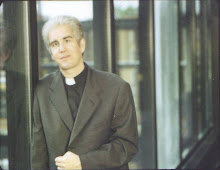This essay is exerted from Craig A. Satterlee, Fulfilled
in Your Hearing as an Ecumenical Contribution and Opportunity,” We Preach Christ Crucified: A Conference on Catholic
Preaching, University of Notre Dame, Notre Dame, IN, June 25-27, 2012. (http://www.youtube.com/watch?v=Z9_JGb_bAXI)
Somehow,
Advent seems an appropriate time to reflect on preaching and prayer. “How does
prayer factor into sermon preparation?” I am never certain how to answer that
question, and so I am constantly on the lookout for help. In June, I presented a
paper at a conference on Catholic
Preaching at The University of Notre Dame marking the fortieth
anniversary of Fulfilled in Your Hearing,
a reflection on the meaning of the homily in the Sunday Mass published by the
National Conference of Catholic Bishops. I have been reading this helpful
document for seventeen years if only because of the way it reminds me that
prayer is essential to sermon preparation (Fulfilled
in Your Hearing, p. 11).
In
terms of homiletic method, Fulfilled in
Your Hearing declares that preachers are, above all else, to be prayerful.
We are not talking about prayer alongside preparation for preaching, or prayer
over and above preparation. Rather, prayer is the very heart and center of
preparation, with the goal that the word of God in the Scriptures is “interiorized”
(Fulfilled in Your Hearing, p. 11). Preachers
pray over the readings seeking the fire of the Holy Spirit to kindle “the now
meaning” (Fulfilled in Your
Hearing, p. 10) in our hearts. This takes us beyond exegesis, as well as
our own agendas and impressions, to doggedly question, even implore, God about
what word God is speaking to this assembly on this occasion.
This
kind of prayer changes the preacher.
FIYH reminds preachers that
proclaiming Christ crucified in a particular Christian assembly requires that
preachers be listeners before they are speakers, remaining open to the Lord’s
voice not only in the Scriptures but in the events of our daily lives and the
experience of our brothers and sisters (Fulfilled
in Your Hearing, p. 10). Claiming the role of listener is where Fulfilled in Your Hearing and Roman
Catholic preaching have most impacted me personally as I have embraced
preaching as my primary spiritual discipline and sermon preparation as prayer.
I am not alone. Michael Pasquarello, Granger E. and Anna A. Fisher Professor of
Preaching at Asbury Theological Seminary, increasingly emphasizes in his
classes that the primary responsibility of the preacher is to be a listener
rather than the culturally accommodated role of "communicator."
In an email exchange, Dr. Pasquarello observes,
The primary communicator to, in, and
through the Christian community is the living God through the presence of the
risen Christ and by the power of the Spirit. Prayer is attentiveness and
receptivity in the presence of God. The current faddish turn to
"topical" preaching does not preach by means of Scripture, but rather
skims a "relevant" topic from the surface in order to serve a
predetermined agenda, program, or goal. Evangelicals and Mainliners both
like this approach. But this leaves no space within the worship of God for the
fulfillment of the Word in its speaking and hearing. Luke 4, the
inaugural sermon of Jesus, shows just how resistant we are to this kind of
vulnerable listening? (Michael Pasquarello, "Re: Fulfilled in Your
Hearing," Message to the author, 6 June 2012, Email).
Attentively
listening to the Scripture and the people, FIYH
asserts, is perhaps the form of prayer most appropriate to the spirituality of
the preacher (Fulfilled in Your Hearing, p.
10). We pray that God will open the heart of the assembly, so that God’s Word
falls on receptive ears. We pray for ourselves, that God will guide our
preparation, help us maintain our role as what one homiletician has called a kind
of “interloper” in the assembly, and grant us grace to differentiate our words
from God’s, so that we do not preach ”what might be expedient, popular, burning
in the preacher’s heart, the correct answer, or best course of action, but not
necessarily a word from God” (Craig A. Satterlee, When God Speaks through Change: Preaching in Times of Congregational
Transition (Herndon, VA: The Alban Institute, 2005), p. 51),
Preachers pray, asking and expecting the real movement of
the Holy Spirit in themselves and in the assembly.
If
you want to know what I hear as I pray over the weekly lectionary readings, the
events of our daily lives, and the experience of our brothers and sisters,
visit my “virtual logjams” at http://craigasatterlee.com.
I
pray for you and Advent that exceeds your expectations and a Christmas that
fills you to overflowing with joy.
Craig A. Satterlee

No comments:
Post a Comment